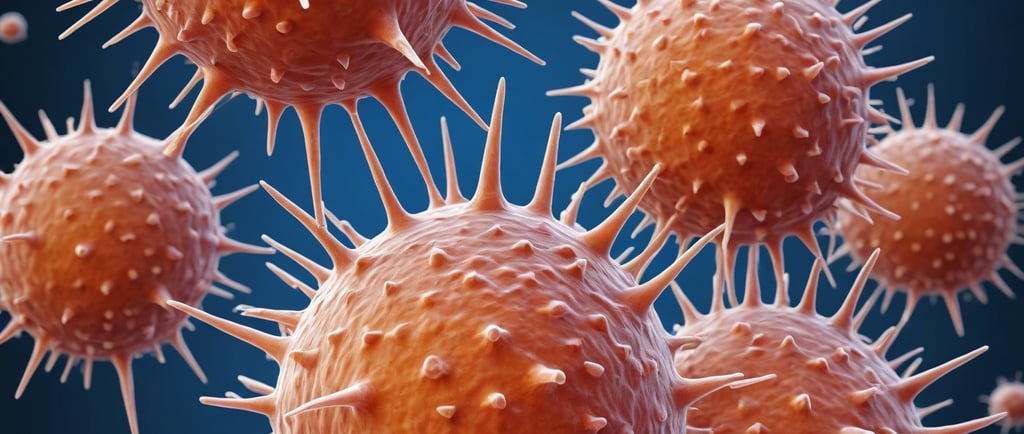"Uncover the truth behind the groundbreaking discovery of the causes of the world's biggest problems. 'The Root Causes' will change how you view the world!"
Understanding Endothelial Cells: Their Role in Cancer and Lifestyle Modifications
Endothelial cells, which line blood vessels, play a critical role in vascular health, regulating blood flow, nutrient delivery, and waste removal. However, endothelial dysfunction is closely linked to various diseases, including cancer, as gene mutations in these cells can promote tumor growth and metastasis. When endothelial cells are damaged, they become more permeable, allowing tumors to access oxygen and nutrients, thereby fueling their growth. Environmental factors, such as exposure to carcinogens and poor lifestyle choices, including excessive sugar intake and seed oil consumption, further exacerbate endothelial dysfunction. These factors increase inflammation and elevate intracellular calcium levels, triggering pathways like PKC/Akt/mTOR and CaM/CaMKII, which promote cancer development. Thus, maintaining endothelial health through diet, exercise, and reducing exposure to harmful substances is crucial in managing cancer risk and promoting overall vascular health.
DISEASES
Glenn Rosaroso Vale, BSMT, MS(IT), MBA
12/6/20243 min read


The Role of Endothelial Cells in Cancer Progression
Endothelial cells, which line the blood vessels, play a critical role in maintaining vascular health by regulating blood flow, nutrient delivery, and waste removal. However, their dysfunction is closely linked to various diseases, including cancer. In cancer, endothelial cells can interact with tumor cells, creating a conducive environment for tumor growth and metastasis. This interaction often involves genetic mutations within the endothelial cells, which can lead to increased permeability of blood vessels. As a result, tumors gain easier access to essential nutrients and oxygen, fueling their growth and spreading cancer throughout the body.
Gene Mutations and Risk Factors in Endothelial Dysfunction
Gene mutations are a key contributor to endothelial dysfunction, which in turn increases the risk of cancer. These mutations can affect endothelial cell function, promoting angiogenesis—the process through which new blood vessels form to supply growing tumors. Various risk factors, including genetics, environmental exposures, and lifestyle choices, can influence these mutations and contribute to endothelial dysfunction. Certain genetic mutations within endothelial cells may lead to abnormal blood vessel formation, further supporting cancer progression. Additionally, environmental factors such as exposure to carcinogens, including chemicals found in tobacco smoke, pesticides, and certain food additives, can trigger these mutations and promote cancer development. It is essential to address these risk factors to reduce the likelihood of endothelial dysfunction and its associated cancer risks.
Managing Endothelial Health Through Lifestyle Changes
While gene mutations and environmental exposures play a significant role in endothelial dysfunction, lifestyle modifications are a powerful tool in maintaining endothelial health and potentially reducing cancer risk. One of the most impactful lifestyle changes involves dietary choices. Research, including findings from Dr. Gary Fettke in 2021, suggests that limiting carbohydrate intake to 4 grams at a time can help manage blood sugar levels, thereby reducing the risk of endothelial dysfunction. Elevated blood sugar levels can contribute to inflammation, which damages endothelial cells and promotes cancer cell growth. In addition to regulating carbohydrates, avoiding seed oils—especially those high in omega-6 linoleic acid—is crucial for endothelial health. Excess omega-6 fatty acids promote inflammation, leading to endothelial dysfunction and potentially increasing the risk of cancer.
Environmental Factors and Carcinogen Exposure
In addition to lifestyle choices, it is vital to avoid exposure to environmental carcinogens. Certain processed foods containing nitrates, for example, can react with amines in the body to form harmful nitrosamines—carcinogenic molecules that promote cancer. Exposure to smoking, asbestos, and other toxins, such as pesticides and herbicides, must also be avoided as these can lead to gene mutations in endothelial cells, increasing the likelihood of cancer. Such exposures disrupt normal endothelial cell function and can trigger the genetic changes that fuel cancer development.
The Pathways Linking Endothelial Dysfunction to Cancer
Endothelial dysfunction is closely tied to several key signaling pathways that contribute to cancer progression. One such pathway is the PKC/Akt/mTOR pathway, which regulates cell growth, survival, and metabolism. Another important pathway is the calmodulin (CaM)/CaMKII pathway, which is involved in cell signaling and gene expression. Both of these pathways are activated when intracellular calcium levels increase. When calcium levels are elevated, these pathways become hyperactivated, leading to abnormal cell growth and cancer progression. Therefore, maintaining controlled calcium levels in the body is critical for preventing cancer development.
To prevent the activation of these cancer-promoting pathways, it is essential to regulate calcium levels, particularly by avoiding dietary factors that contribute to calcium elevation. The major contributors to this elevation are high sugar intake and excess seed oil consumption, both of which can disrupt normal calcium signaling. High sugar intake causes elevated blood glucose levels, which in turn increase intracellular calcium by triggering the release of insulin and inflammatory signals. Seed oils, especially those high in omega-6 fatty acids, also promote inflammation, further contributing to endothelial dysfunction and calcium dysregulation.
Conclusion: Proactive Steps to Prevent Endothelial Dysfunction and Cancer
The relationship between endothelial cells and cancer progression is complex, with gene mutations, environmental exposures, and lifestyle choices all playing pivotal roles. However, through strategic lifestyle modifications—including dietary changes, regular physical activity, and avoiding harmful exposures—we can significantly reduce the risk of endothelial dysfunction and cancer. Limiting carbohydrate intake, avoiding seed oils, and steering clear of environmental carcinogens can help maintain healthy endothelial cells and prevent the pathways that contribute to cancer development. By understanding the intricate connection between endothelial health and cancer, we can take proactive steps to protect our vascular health and reduce cancer risks, ultimately improving overall health and well-being.
Health
Understanding illness to empower your well-being journey.
Wellness
Knowledge
info@rootcauseprevention.com
903-268-6664
© 2024. All rights reserved.
grfv@sbcgloal.net